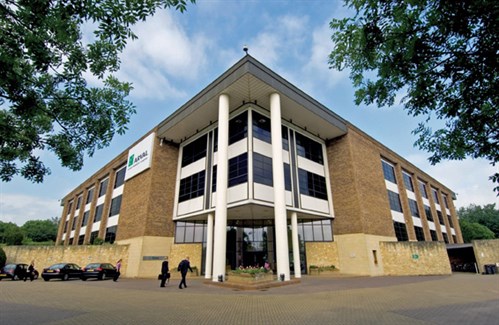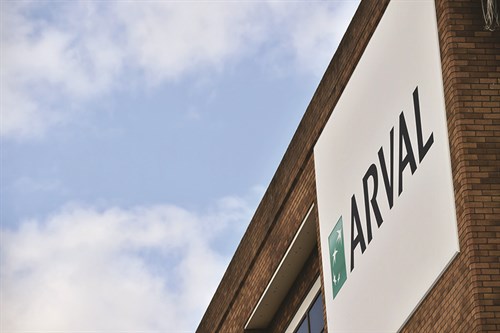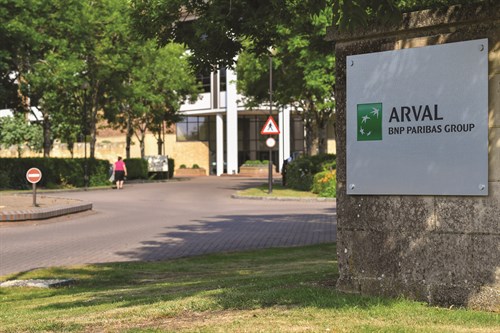
The start point for the best source of fleet information |
In Focus: Arval Consultancy
Date: 17 April 2019 | Author: Rachel Boagey
Rewind 20 years and having a fleet consultancy within a leasing company would have been pretty much unheard of. But in more recent times, as the fleet landscape has become far more complex, many firms have recognised the need to produce tangible results for fleet customers, and have recognised a need to provide guidance on the constantly evolving landscape in which they work.
Arval's fleet consultancy team, which currently consists of five people, advises customers on matters such as reducing costs and environmental impact, improving health and safety, complying with regulation and boosting driver satisfaction. We met with its head of consultancy, Shaun Sadlier, at the company's HQ in Swindon to discuss the advice and guidance the leasing firm has been providing over the years, and why its role is so vital to fleets.
Sadlier was approached in November 2015 and asked to head up the UK consultancy team for Arval.

"We have never seen so much change at any one time," Sadlier explains. "That was the reason the consultancy team was set up, and we have continued to expand ever since."
Dubbed Smart - Sustainable Mobility and Responsibility Targets - Arval's approach builds on its research, which recently found that 59% of companies and 75% of large fleets prioritise CO2 emissions in their car policies. Sadlier explains that Smart came to light around the time of 'dieselgate' - the time when Arval realised its customers needed its help.
"For some customers, the focus is on reducing costs, for others it is reducing their environmental impact," Sadlier tells us. "Health and safety, compliance and efficiency also tend to be high on the list.
"We understand you need to be in control, but may require guidance and advice to see the bigger picture. Our industry expertise means we can work with fleets to help them meet their goals."

Following on from the demonisation of diesel and the introduction of the new WLTP regime for fuel consumption as well as the new RDE emissions tests, Sadlier believes fleets need all of the guidance they can get to navigate it.
"We have a strong responsibility now to support not only our B2B customers but also their end users, who are also our customers, to get them through this maze."
A very high percentage of the work Arval is doing is around the diversity of fuel that needs to be introduced.
"Increasingly, the use of the word, 'alternative' in this context has started to bother me," explains Sadlier. "It means an alternative to petrol and diesel, of course, which in one respect is understandable. These are the well-established norms. However, if we are going to start integrating these newer fuel options into fleets on an everyday basis, we need to stop thinking of them as exceptions and consider them as part of the norm, too."
Like most other leading consultants on fleet issues, Arval believes fleets should be starting to use all available fuel types that are appropriate to their needs, with each carefully evaluated to fit its application.
"In fact, we have just introduced something called the Driver Powertrain Compatibility Tool, designed to help drivers identify the best fuel choice for them," says Sadlier. "Based on eight questions covering driving cycles, average daily distances, work and business journeys, driving styles, towing, vehicle recharging availability and even driving holidays, it shows a percentage suitability for each of five options - diesel, petrol, hybrid, plug-in hybrid and electric."

These fuels are all shown as equals in the results and none of them are labelled as
an alternative.
"I believe this is very important," Sadlier says. "If drivers and fleets are to see electrics and hybrids as practical options, we need to start treating them as simply normal. At the end of the day, these are all viable, mainstream fuel choices and they all have a place in the fleets of today. We need to start presenting them
as such."
Sadlier says that when he joined the team, and 'dieselgate' was kicking off, the company was already engaging with stakeholders from across the hydrogen supply chain in the Swindon area.
"We were already part of the hydrogen hub and it has been really great to see how the technology is developing," he says. "It is an initiative funded by the government.
"There is more hydrogen in Swindon than anywhere else in the country, we are operating seven vehicles and there are two hydrogen stations in this area. It is new technology still, but it is developing at a fast rate."
The Arval consultancy fleet has increased significantly towards non-conventional fuel types, and since Sadlier started working there it has switched from an 80% diesel fleet to an 80% alternatively fuelled fleet.
"From the launch of the new car policy I introduced, it was almost instant," he explains. "We are pushing through our smart methodology and the message going to employees is very much about the transition to green. We are talking to customers about the advantages and the drivers are just taking to it. This probably is the biggest change since I started and I would say advising customers about this probably takes up about 70% of our consultancy resource alone."
Recently, a company contacted Arval asking it to look at whether adopting electric vans might be a good idea for a certain part of its fleet.
"We will work on that topic for them, discover if they are fit for purpose and see if the payload requirements match up, and that is just one example of what we can do for fleets," says Sadlier.
Arval can also carry out a customer questionnaire to assess the fleet in terms of WLTP, corporate social responsibility and driver training, for example.
"We can then have a discussion about keeping them green, keep their drivers happy, and solving all of the other things they might be struggling with," Sadlier explains.
Since Smart's inception, Arval has been constantly working on and enhancing the methodology.
"We have recently brought in road risk as well," Sadlier says. "If you have got drivers behaving properly on the road your fuel consumption levels will follow suit."

Arval can check a company's road risk documents for clarity and that the policies are well communicated to drivers. Some fleets have choices of manufacturers and the objective might be to take certain manufacturers out of the line-up completely if their cars aren't proving as efficient, or maybe just identify one vehicle class that is costing them money
"SUV's, for example, are very popular now but they can be far more expensive to run than estate cars," says Sadlier.
"We tell the client what will benefit them and what will not, and we can also show them an evaluation over time and whether what they have done has actually made improvements and saved money. We can capture usually about four years of information too, and can set out some clear objectives and advise on how they can achieve them. However, it is important to remember that you can't change a fleet in one day. It is all baby steps - but small steps lead to big leaps."
Another thing the company has been able to look into for fleets is data. Sadlier explains that often fleets don't have access to their data at all, and if they do, they often don't know what to do with it in order to help themselves.
"I'm tasked to build and use that data in a more effective way," he says. "We build tools and we can go to a customer before thy even know they have an issue, looking at best practice and opportunities for cost savings. We can say 'this is an issue based on your data and these are the recommendations to solve that and make your fleet as cost effective and green as possible'."
Sadlier tells us he was particularly fond of being involved in developing Arval's driver profiling tool.
"What we see is a number of myths around where electric vehicles should be used and the major one that we see is that they should only be used for short-distance, low-mileage users," he tells us.
David Watts, another consultant on the team, has been almost evangelical in trying to change this myth and break it, Sadlier tells us.
"Say there are two drivers who do 25,000 miles per annum, which is quite heavy annual mileage. Driver A is doing a fairly set pattern of mileage per week. He is doing 110 miles and he can do it in an EV. He can drive to work, come back, charge up at home - 25,000 miles in an EV is not an issue for him.
"Driver B is doing 25,000 miles, but twice a week he has to do 250 miles in the day for his business. Can he get there and back? With the vehicles available to a company car driver at the moment, probably not. Does he want to stop off for an hour so he can get back? Probably not. That is the myth we are trying to change. Whether an EV is suitable is an individual thing. You can do high mileage and an EV can be effective, and it can also not be effective.
"Our scoring system is designed to look at a fleet and say diesel scores best for something but actually in a percentage electric is only 5-10% behind. If you take that forward, what does a driver need to do to change a few things about their driving profile and the way they do their business? Maybe then you can say actually, do you know what, it can work. The view on EVs at the moment is often black and white, but ours is to put them in the grey area and then look at helpful but fine adjustments that could make a big difference."
Also, Sadlier explains that technology is evolving at such a rate that soon new vehicles will have more range and be more suitable for business drivers anyway.
"If you look back a few years ago to around 2015, you only had a few options available in EVs, and that was the Renault Zoe or maybe a Tesla, but actually what business car drivers generally need is the middle ground and there wasn't much there apart from a few PHEVs, but now that middle ground is slowly being filled with more affordable models. That opens it up to different drivers."
At the moment, Sadlier explains they are waiting for HMRC consultation and the government has a big challenge on its hands.
"They don't really want to increase the cost for drivers and employers, but they also have to hit objectives for clean air and zero emissions," he explains.
"Then you look at the availability of electric cars. In the UK we are being very squeezed on that at this particular time. Part of the challenge is getting fleets ready and prepared, and vehicles not being available for them.
"Therefore, Arval's focus is to get its customers prepared for that, otherwise there will be panic and frustration. It is not ideal for a driver ordering an electric car six to nine months ahead of the lead times, so even though they might be ready for EVs we need to ensure they understand the problems in the market right now."
Sadlier explains that increasing diversity of fuel types in fleets will continue for a long time before it just becomes business as usual to have EVs. Another area which is changing in Arval's view is the company car.
"It is being squeezed and we know it," Sadlier says. "What companies are now looking for from leasing companies and suppliers are what are the other options we can support, not just for the company mileage drivers but the whole employee population.
"I think the company car still absolutely has a future. Vans are less affected, but we are comfortable saying that we see a future for company cars too.
"What is unknown is taxation. What is my BIK going to be, and do I continue with my company car? If I take the cash what are my options?"
Although Sadlier believes in the future of the company car, even if there isn't one he says the impact on Arval and other leasing companies will not be as much as previously thought.
"As a supplier we are approaching a very different world and while the company car might decrease, we will actually gain business through other funding solutions."
Arval already has one client where company car numbers have reduced, but the other funding solutions mean that the fleet is even bigger than it was three years ago.
"I think that is the way things are going to go. Leasing companies just have to adapt," he says.
In the future, therefore, Sadlier says Arval may become more of a mobility provider than a leasing company.
"We will have to look at all different avenues and basically we can't stay still. We already do some of these things and we will have to keep doing them to move forward. The company car will have its place, we are sure of it, we just need to make sure we can fill those other gaps too and support the employee."
Overall, Sadlier believes there many new opportunities for Arval's consulting division.
"We are growing quite significantly and we think that for a time-served fleet manager we are going to be a lifesaver. I really do believe it is our responsibility to support them, produce guides and content, and answer their questions. Even if they are not a customer of ours, perhaps we can still help them and they might become one in future. Who knows when they may need help, and we're ready and waiting to provide it."










